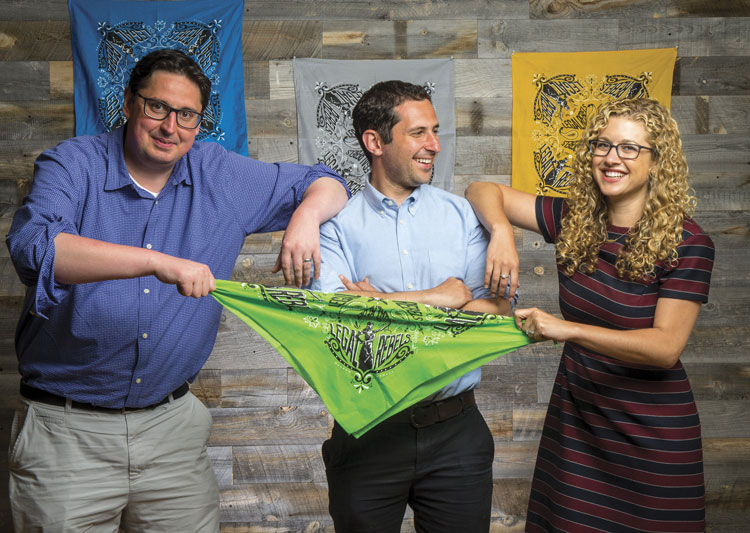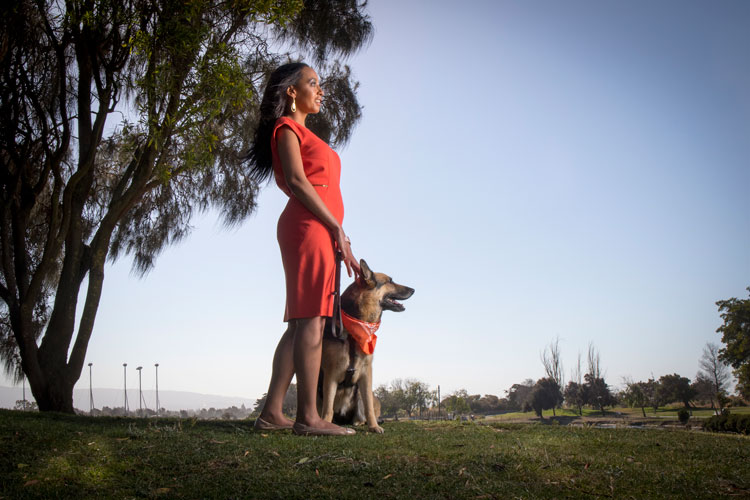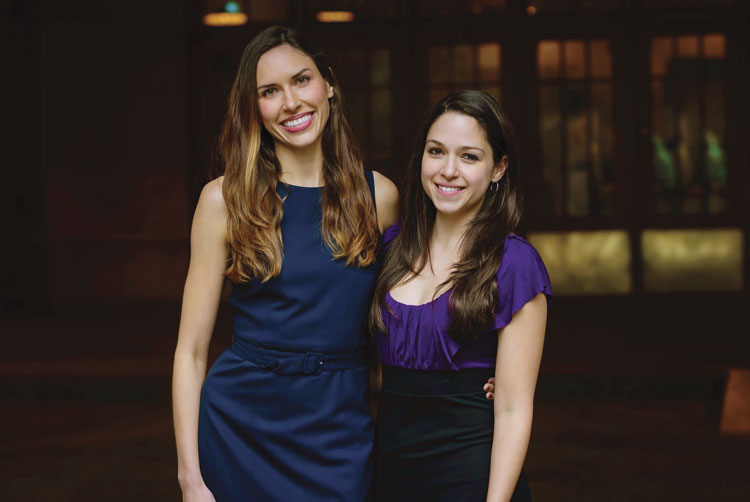Legal Rebels: Pattern of Progress

Call it a banner (and bandana) Legal Rebels year. And talk about accomplishments: This year’s 13 Rebels are providing new ways to help immigrants find legal assistance, businesses comply with accessibility laws, drivers deal with parking tickets, and lawyers do their time and billing—painlessly.
One Rebel rose from a devastating family health issue to provide legal services for firms that hire people with criminal records. One uses her experience as a “Deafblind” woman to teach firms how to work with employees who have disabilities. One lives on friends’ couches to keep down expenses as her litigation management business takes off.
We also feature a professor handling a program that combines lawyers, business students and STEM entrepreneurs to grow projects from idea to product; two women whose legal service helps lawyers and law firms find pro bono projects; a crew using artificial intelligence to augment legal research; and a lawyer/IT director whose work has affected criminal record expungement, bail reform and class action work.
It’s an extraordinary list of people improving access to justice, helping lawyers work more efficiently and providing service to society.
Check out their miniprofiles in the pages ahead, written by Terry Carter, Lorelei Laird, Victor Li, Jason Tashea and Stephanie Francis Ward. Read more details about these efforts at ABAJournal.com/legalrebels.
While you’re there, check out our past Rebels, find (or add) some legal practice strategies, read fresh ideas provided by our New Normal contributors and listen to podcasts, including our latest Trailblazer series speaking with the daring doers who were changing law practice before Legal Rebels began.

Pablo Arredondo, Jake Heller and Laura Safdie of Casetext created a tech tool to help lawyers function more effectively. Photo by Tony Avelar.
Their AI Assistant Is Freeing Up Legal Research
When it comes to information, Casetext CEO Jake Heller, 32, thinks the open-sourced and open-knowledge movement can be the great equalizer. So he launched the company in 2013. Similar to crowd-sourced sites such as Wikipedia, Casetext relies on users to provide annotations, descriptions, references and tags for cases and statutes.
Three years later, Casetext added the Case Analysis Research Assistant, an artificial intelligence researcher, something that lawyers had told him was impossible.
But Casetext’s vice president, Pablo Arredondo, 38, thought it was. “I hadpreviously worked in patent law,” he says. “What I realized was that companies such as Apple or Google had tools that were innovative and beautiful. But the tools used by their outside counsel were not.”
For the company’s chief operating officer, Laura Safdie, 32, its main mission is to give lawyers tools to enable them to function more effectively.
“All of our ideas come from people who tell us things like: ‘I used to hate doing that when I practiced law’ or ‘I wish I had that when I was practicing law,’ ” she says. —Victor Li
» Read extended profile of Pablo Arredondo, Jake Heller and Laura Safdie

Photo of Haben Girma by Tony Avelar
Leading the Way for People with Disabilities
Haben Girma, a Harvard Law School graduate, has limited hearing and vision and refers to herself as “Deafblind.”
“It should be one word, no hyphen, and I prefer to capitalize the D because it’s a cultural identity,” says Girma, 29, a former Skadden, Arps, Slate, Meagher & Flom fellow whose work centers on consulting and public speaking about the benefits of fully accessible products and services, as well as hiring people with disabilities.
Before she went into consulting, she practiced litigation for 2½ years with the nonprofit Disability Rights Advocates and represented the National Federation of the Blind in an accessibility lawsuit brought against Scribd, a digital library subscription service. The case settled in 2015 after the company lost its summary judgment motion in the U.S. District Court for the District of Vermont.
“Litigation is powerful, but I feel like a lot of the accessibility barriers are due to lack of education,” Girma says. “I feel like I havea unique talent to inspire and motivate people to remove those barriers.” —Stephanie Francis Ward
» Read extended profile of Haben Girma

Photo of Felicity Conrad and Kristen Sonday courtesy of Paladin
Helping Find Pro Bono That Fits
Felicity Conrad and Kristen Sonday met at Gratitude Migration, a New Jersey shore art and global music festival.
But rather than focusing on the festivities, they spent most of the evening talking about a pro bono asylum case Conrad had recently won for a South American man and how technology could amplify social justice.
Conrad, 28, had recently left an associate position with Skadden, Arps, Slate, Meagher & Flom, where she practiced international litigation and arbitration.
“I was working at the time at a hedge fund and was itching to get back in a startup. I had just wrapped up my role at Grouper,” says Sonday, 30, referring to the former social club app that paired groups of friends for drinks. Sonday previously worked as its director of international operations.
This year, the pair launched Paladin, a platform that helps organizations manage, staff and track pro bono efforts.
“Our platform makes sure that the right attorneys are seeing the right opportunities,” says Conrad, who is the CEO. The service started in New York City, Baltimore, San Francisco and Chicago and is now available across the country, says Sonday, the chief operating officer.
“Learning about the nuances related to pro bono has been fascinating to me,” Sonday says. —S.F.W.
» Read extended profile of Felicity Conrad and Kristen Sonday



